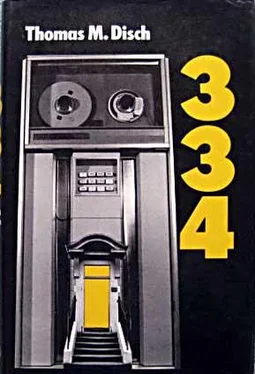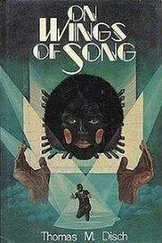Half a damned hour.
The entrance to McGonagall’s office was something from the annals of the Met. The door sublimed into flame and they passed through, a Pamina, a Tamino, accompanied appropriately by flute and drum, strings and horns. A fat man in a white shift welcomed them mutely into his bargain-rate temple of wisdom, clasping first Pamina’s, then Tamino’s hands in his. A sensitivist obviously.
He pressed his pink-frosted middle-aged face close to Boz’s, as though he were reading its fine print. “You’re Boz,” he said reverently. Then with a glance in her direction: “And you’re Milly.”
“No,” she said peevishly (it was that half hour), “I’m Boz, and she’s Milly.”
“Sometimes,” McGonagall said, letting go, “the best solution is divorce. I want you both to understand that if that should be my opinion in your case, I won’t hesitate to say so. If you’re annoyed that I kept you waiting so long, tant pis, since it was for a good reason. It rids us of our company manners from the start. And what is the first thing you say when you come in here? That your husband is a woman! How did it make you feel, Boz, to know that Milly would like to cut off your balls and wear them herself?”
Boz shrugged, long-suffering, ever-likable. “I thought it was funny.”
“Ha,” laughed McGonagall, “that’s what you thought. But what did you feel? Did you want to strike her? Were you afraid? Or secretly pleased?”
“That’s it in a nutshell.”
McGonagall’s living body sank into something pneumatic and blue and floated there like a giant white squid bobbing on the calm surface of a summer sea. “Well then, tell me about your sex life, Mrs. Hanson.”
“Our sex life is pretty,” Milly said.
“Adventurous,” Boz continued.
“And quite frequent.” She folded her pretty, faultless arms.
“When we’re together,” Boz added. A grace note of genuine self-pity decorated the flat irony of the statement. This soon he felt his insides squeezing some idle tears from the appropriate glands; while, in other glands, Milly had begun to churn up petty grievances into a lovely smooth yellow anger. In this, as in so many other ways, they achieved a kind of symmetry between them, they made a pair.
“Your jobs?”
“All that kind of thing is on our profiles.” Milly said. “You’ve had a month to look at them. A half hour, at the very least.”
“But on your profile, Mrs. Hanson, there’s no mention of this remarkable reluctance of yours, this grudging every word.” He lifted two ambiguous fingers, scolding and blessing her in a single gesture. Then, to Boz: “What do you do, Boz?”
“Oh. I’m strictly a husband. Milly’s the breadwinner.”
They both looked at Milly.
“I demonstrate sex in the high schools,” she said.
“Sometimes,” McGonagall said spilling sideways meditatively over his blue balloon (like all very clever fat men he knew how to pretend to be Buddha), “what are thought to be marital difficulties have their origin in job problems.”
Milly smiled an assured porcelain smile. “The city tests us every semester on job satisfaction, Mr. McGonagall. Last time I came out a little high on the ambition scale, but not above the mean score for those who eventually have moved on into administrative work. Boz and I are here because we can’t spend two hours together without starting to fight. I can’t sleep in the same bed anymore, and he gets heartburn when we eat together.”
“Well, let’s assume for now that you are adjusted to your job. How about you, Boz? Have you been happy being ‘just a husband’?”
Boz fingered the gauze knotted round his throat. “Well, no … I guess I’m not completely happy or we wouldn’t be here. I get—oh. I don’t know—restless. Sometimes. But I know I wouldn’t be any happier working at a job. Jobs are like going to church: it’s nice once or twice a year to sing along and eat something and all that, but unless you really believe there’s something holy going on, it gets to be a drag going in every single week.”
“Have you ever had a real job?”
“A couple times. I hated it. I think most people must hate their jobs. I mean, why else do they pay people to work?”
“Yet something is wrong, Boz. Something is missing from your life that ought to be there.”
“Something. I don’t know what.” He looked downhearted.
McGonagall reached out for his hand. Human contact was of fundamental importance in McGonagall’s business. “Children?” he asked, turning to Milly, after this episode of warmth and feeling.
“We can’t afford children.”
“Would you want them, if you felt you could afford them?”
She pursed her lips. “Oh yes, very much.”
“Lots of children?”
“Really!”
“There are people, you know, who do want lots of children, who’d have as many as they could if it weren’t for the Regents system.”
“My mother,” Boz volunteered, “had four kids. They all came before the Genetic Testing Act, of course, except for me, and I was only allowed then because Jimmy, her oldest one, got killed in a riot, or a dance, or something, when he was fourteen.”
“Do you have pets at home?” McGonagall’s drift was clear.
“A cat,” Boz said, “and a rubber plant.”
“Who takes care of the cat mostly?”
“I do, but that’s because I’m there through the day. Since I’ve been gone Milly’s had to take care of Tabby. It must be lonely for her. For old Tabbycat.”
“Kittens?”
Boz shook his head.
“No,” Milly said. “I had her spayed.”
Boz could almost hear McGonagall thinking: Oh ho! He knew how the session would continue from this point and that the heat was off him and on Milly. McGonagall might be right, or he might not, but he had an idea between his jaws and he wasn’t letting loose: Milly needed to have a baby (a woman’s fulfillment), and Boz, well, it looked like Boz was going to be a mother.
Sure enough, by the end of the session Milly was spread out on the pliant white floor, back uparched, screaming (“Yes, a baby! I want a baby! Yes, a baby! A baby!”) and having hysterical simulated birth spasms. It was beautiful. Milly hadn’t broken down, really broken all the way down, and cried in how long? Years. It was one hundred per cent beautiful.
Afterwards they decided to go down by the stairs, which were dusty and dark and tremendously erotic. They made it on the 28th floor landing and, their legs all atremble, again on the 12th. The juice shot out of him in dazzling gigantic hiccoughs, like milk spurting out of a full-to-the-top two-quart container, so much they neither could believe it: a heavenly breakfast, a miracle proving their existence, and a promise they were both determined to keep.
It wasn’t all sweetness and roses, by any means. They had more paper work to do than from all the 1040 forms they’d ever prepared. Plus visits to a pregnancy counselor; to the hospital to get the prescriptions they both had to start taking; then reserving a bottle at Mount Sinai for after Milly’s fourth month (the city would pay for that, so she could stay on the job); and the final solemn moment at the Regents office when Milly drank the first bitter glass of the anticontraceptive agent. (She was sick the rest of the day, but did she complain? Yes.) For two weeks after that she couldn’t drink anything that came out of the tap in the apartment until, happy day, her morning test showed a positive reading.
They decided it would be a girl: Loretta, after Boz’s sister. They redecided, later on: Aphra, Murray, Algebra, Sniffles (Boz’s preferences), and Pamela, Grace, Lulu, and Maureen (Milly’s preferences).
Читать дальше












